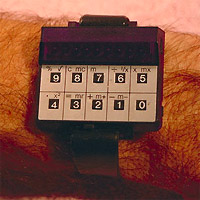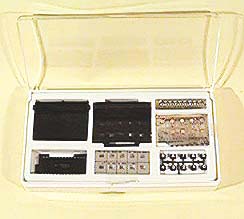|
 Surely
one of Sinclair's most unusual products, the strange-looking
Wrist Calculator (right, being worn)
was launched in February 1977. It was the first
product of Science of Cambridge, the company which
came between Sinclair Radionics and Sinclair Research.
In some ways it was ahead of its time, anticipating
the LCD calculator watches of the 1980s. Surely
one of Sinclair's most unusual products, the strange-looking
Wrist Calculator (right, being worn)
was launched in February 1977. It was the first
product of Science of Cambridge, the company which
came between Sinclair Radionics and Sinclair Research.
In some ways it was ahead of its time, anticipating
the LCD calculator watches of the 1980s.
The Wrist Calculator was assembled
by in-house designer John Pemberton out of redundant
calculator chips and displays, mounted on a little
printed circuit board with half a dozen of the
smallest cells available to power it. The result
was described uncharitably (if accurately) as
"an eyesore in black plastic".
 Amazingly,
it actually came in kit form (right) -
Sinclair evidently had not learned the lessons
of the Black
Watch fiasco. Not surprisingly, given
the tiny components, it was extraordinarily tricky
to assemble. Once completed, there was only a
fair to middling chance of it working. John Pemberton
recalls that it was designed to "minimal
tolerances", which meant that only if one
was lucky enough to get a set of parts all of
which were at or below the mean size of the prototype's
components could one get it to fit within the
case. It was not uncommon for the parts to be
the wrong size, making the device impossible to
assemble. Amazingly,
it actually came in kit form (right) -
Sinclair evidently had not learned the lessons
of the Black
Watch fiasco. Not surprisingly, given
the tiny components, it was extraordinarily tricky
to assemble. Once completed, there was only a
fair to middling chance of it working. John Pemberton
recalls that it was designed to "minimal
tolerances", which meant that only if one
was lucky enough to get a set of parts all of
which were at or below the mean size of the prototype's
components could one get it to fit within the
case. It was not uncommon for the parts to be
the wrong size, making the device impossible to
assemble.
Even so, more than 10,000 Wrist
Calculators were sold to masochistic hobbyists
from all parts of the world, for a revenue in
excess of £50,000. Another 20,000 were exported
to the United States, though sales there were
dismal and much of the exported stock was returned
unsold to Sinclair.

Back
to top
|